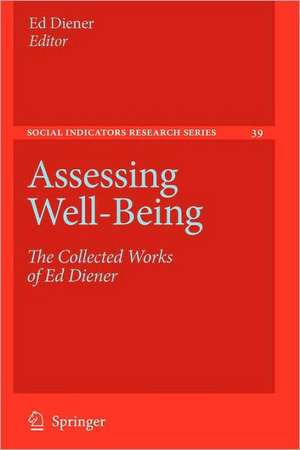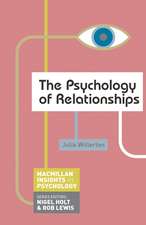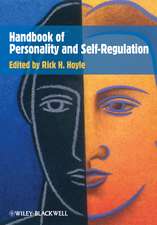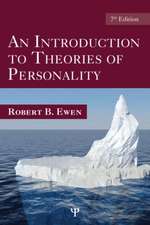Assessing Well-Being: The Collected Works of Ed Diener: Social Indicators Research Series, cartea 39
Editat de Ed Dieneren Limba Engleză Paperback – 9 iun 2009
Din seria Social Indicators Research Series
- 15%
 Preț: 601.13 lei
Preț: 601.13 lei - 5%
 Preț: 861.64 lei
Preț: 861.64 lei - 18%
 Preț: 945.47 lei
Preț: 945.47 lei - 15%
 Preț: 644.30 lei
Preț: 644.30 lei - 18%
 Preț: 959.50 lei
Preț: 959.50 lei - 15%
 Preț: 645.60 lei
Preț: 645.60 lei - 18%
 Preț: 1234.94 lei
Preț: 1234.94 lei - 15%
 Preț: 640.06 lei
Preț: 640.06 lei - 15%
 Preț: 635.47 lei
Preț: 635.47 lei - 5%
 Preț: 1105.21 lei
Preț: 1105.21 lei - 15%
 Preț: 646.11 lei
Preț: 646.11 lei - 18%
 Preț: 1233.06 lei
Preț: 1233.06 lei - 18%
 Preț: 953.03 lei
Preț: 953.03 lei - 5%
 Preț: 1101.37 lei
Preț: 1101.37 lei - 15%
 Preț: 644.82 lei
Preț: 644.82 lei - 18%
 Preț: 948.92 lei
Preț: 948.92 lei - 15%
 Preț: 642.51 lei
Preț: 642.51 lei - 18%
 Preț: 954.45 lei
Preț: 954.45 lei - 18%
 Preț: 1235.76 lei
Preț: 1235.76 lei -
 Preț: 407.56 lei
Preț: 407.56 lei - 15%
 Preț: 642.83 lei
Preț: 642.83 lei - 18%
 Preț: 955.70 lei
Preț: 955.70 lei - 15%
 Preț: 644.49 lei
Preț: 644.49 lei - 18%
 Preț: 952.89 lei
Preț: 952.89 lei - 15%
 Preț: 648.89 lei
Preț: 648.89 lei - 15%
 Preț: 645.47 lei
Preț: 645.47 lei - 18%
 Preț: 1224.54 lei
Preț: 1224.54 lei
Preț: 775.44 lei
Preț vechi: 945.65 lei
-18% Nou
Puncte Express: 1163
Preț estimativ în valută:
148.40€ • 161.14$ • 124.65£
148.40€ • 161.14$ • 124.65£
Carte tipărită la comandă
Livrare economică 22 aprilie-06 mai
Preluare comenzi: 021 569.72.76
Specificații
ISBN-13: 9789048123537
ISBN-10: 9048123534
Pagini: 274
Ilustrații: X, 274 p.
Dimensiuni: 155 x 235 x 15 mm
Greutate: 0.41 kg
Ediția:2009
Editura: SPRINGER NETHERLANDS
Colecția Springer
Seria Social Indicators Research Series
Locul publicării:Dordrecht, Netherlands
ISBN-10: 9048123534
Pagini: 274
Ilustrații: X, 274 p.
Dimensiuni: 155 x 235 x 15 mm
Greutate: 0.41 kg
Ediția:2009
Editura: SPRINGER NETHERLANDS
Colecția Springer
Seria Social Indicators Research Series
Locul publicării:Dordrecht, Netherlands
Public țintă
ResearchCuprins
– Measuring Well-Being: Collected Theory and Review Works.- Temporal Stability and Cross-Situational Consistency of Affective, Behavioral, and Cognitive Responses.- Assessing Subjective Well-Being: Progress and Opportunities.- The Evolving Concept of Subjective Well-Being: The Multifaceted Nature of Happiness.- Review of the Satisfaction With Life Scale.- Subjective Well-Being: The Convergence and Stability of Self-Report and Non-Self-Report Measures.- Measuring Positive Emotions.- Experience Sampling: Promises and Pitfalls, Strength and Weaknesses.- Life-Satisfaction Is a Momentary Judgment and a Stable Personality Characteristic: The Use of Chronically Accessible and Stable Sources.- Happiness is the Frequency, Not the Intensity, of Positive Versus Negative Affect.- Income’s Differential Influence on Judgments of Life Versus AffectiveWell-Being.- New Measures of Well-Being.- Conclusion: Future Directions in Measuring Well-Being.
Recenzii
From the reviews:“Assessing Well-Being, is concerned with the measurement of life satisfaction. … Also, newly written, they point the way for future research. … Certainly academic researchers interested in well-being will find them extremely useful. … The reprinted book chapters are not so readily available, so their inclusion is a real plus. The audience should extend beyond research psychologists and include policy makers as well as interested members of the general public. … the collected works of Ed Diener are timely, impressive, and useful.” (Christopher Peterson, PsycCRITIQUES, Vol. 54 (50), 2009)
Notă biografică
Ed Diener is the Joseph R. Smiley Distinguished Professor of Psychology at the University of Illinois. He received his doctorate at the University of Washington in 1974, and has been a faculty member at the University of Illinois for the past 34 years. Dr. Diener was the president of both the International Society of Quality of Life Studies and the Society of Personality and Social Psychology. Currently he is the president of the International Positive Psychology Association. Dr. Diener was the editor of the Journal of Personality and Social Psychology and the Journal of Happiness Studies, and he is the founding editor of Perspectives on Psychological Science. Diener has over 240 publications, with about 190 being in the area of the psychology of well-being, and is listed as one of the most highly cited psychologists by the Institute of Scientific Information with over 12,000 citations to his credit. He won the Distinguished Researcher Award from the International Society of Quality of Life Studies, the first Gallup Academic Leadership Award, and the Jack Block Award for Personality Psychology. Dr. Diener also won several teaching awards, including the Oakley-Kundee Award for Undergraduate Teaching at the University of Illinois.
Textul de pe ultima copertă
The Collected Works of Ed Diener, in 3 volumes, present the major works of the leading research scientist studying happiness and well-being. Professor Diener has studied subjective well-being, people’s life satisfaction and positive emotions, for over a quarter of a century, and has published 200 works on the topic, many more than any other scholar. He has studied hundreds of thousands of people in over 140 nations of the world, and the Collected Works present the major findings from those studies. Diener has made many of the major discoveries about well-being, which are outlined in the chapters.
The first volume presents the major theory and review papers of Ed Diener. These publications give a broad overview of findings in the field, and the theories of well-being. As such, the first volume is an absolute must for beginning scholars in this area, and offers a clear tutorial to the history of the field and major findings. The second volume focuses on culture. This volume is most unique, and could sell on its own, as it should appeal to cultural psychologists and anthropologists. The findings in the culture area are mostly all derived from the Diener laboratory and his students. Thus, the papers in this volume represent most of the major publications on culture and well-being. Furthermore, this is the area that is least well-known by most scholars. The third volume on measurement is the most applied and practical one because it discusses all the measures used, and presents new measures. Even for those who do not want to study well-being per se, but want to use some well-being measures in their research, this volume will be of enormous help.
Volume 1: Gives a broad overview of findings and theories on subjective well-being.
Volume 2: Presents most of the major papers on well-being and culture, and the international differences in well-being
Volume 3: Presents discussions of measures of well-being and new measures ofwell-being, and is thus of great value to those who want to select measurement scales for their research
Endorsements
Over the past several decades Professor Diener has contributed more than any other psychologist to the rigorous research of subjective well-being. The collection of this work in this series is going to be of invaluable help to anyone interested in the study of happiness, life-satisfaction, and the emerging discipline of positive psychology. Mihaly Csikszentmihalyi, Professor of Psychology And Management, Claremont Graduate University
Ed Diener, the Jedi Master of the world's happiness researchers, has inspired and informed all of us who have studied and written about happiness. His life's work epitomizes a humanly significant psychological science. How wonderful to have his pioneering writings collected and preserved for future students of human well-being, and for practitioners and social policy makers who are working to promote human flourishing. David G. Myers, Hope College, and author, The Pursuit of Happiness.
Ed Diener's work on life satisfaction -- theory and research -- has been ground-breaking. Having his collected works available will be a great boon to psychologists and policy-makers alike. Christopher Peterson, Professor of Psychology, Univ. of Michigan
By looking at happiness and well-being in many different cultures and societies, from East to West, from New York City to Calcutta slums, and beyond, Ed Diener has forever transformed the field of culture in psychology. Filled with bold theoretical insights and rigorous and, yet, imaginative empirical studies, this volume will be absolutely indispensable for all social and behavioral scientists interested in transformative power of culture on human psychology. Shinobu Kitayama, Professor and Director of the Culture and Cognition Program, Univ. of Michigan
Ed Diener is one of the most productive psychologists in the world working in the field of perceived quality of life or, as he prefers, subjective wellbeing. He has served the profession as a researcher, writer, teacher, officer in professional organizations, editor of leading journals, a member of the editorial board of still more journals as well as a member of the board of the Social Indicators Research Book Series. As an admirer of his work and a good friend, I have learned a lot from him, from his students, his relatives and collaborators. The idea of producing a collection of his works came to me as a result of spending a great deal of time trying to keep up with his work. What a wonderful public and professional service it would be, I thought, as well as a time-saver for me, if we could get a substantial number of his works assembled in one collection. In these three volumes we have not only a fine selection of past works but a good number of new ones as well. So, it is with considerable delight that I write these lines to thank Ed and to lend my support to this important publication. Alex C. Michalos, Ph.D., F.R.S.C., Chancellor, Director, Institute for Social Research and Evaluation, Professor Emeritus, Political Science, Univ. of Northern British Columbia
The first volume presents the major theory and review papers of Ed Diener. These publications give a broad overview of findings in the field, and the theories of well-being. As such, the first volume is an absolute must for beginning scholars in this area, and offers a clear tutorial to the history of the field and major findings. The second volume focuses on culture. This volume is most unique, and could sell on its own, as it should appeal to cultural psychologists and anthropologists. The findings in the culture area are mostly all derived from the Diener laboratory and his students. Thus, the papers in this volume represent most of the major publications on culture and well-being. Furthermore, this is the area that is least well-known by most scholars. The third volume on measurement is the most applied and practical one because it discusses all the measures used, and presents new measures. Even for those who do not want to study well-being per se, but want to use some well-being measures in their research, this volume will be of enormous help.
Volume 1: Gives a broad overview of findings and theories on subjective well-being.
Volume 2: Presents most of the major papers on well-being and culture, and the international differences in well-being
Volume 3: Presents discussions of measures of well-being and new measures ofwell-being, and is thus of great value to those who want to select measurement scales for their research
Endorsements
Over the past several decades Professor Diener has contributed more than any other psychologist to the rigorous research of subjective well-being. The collection of this work in this series is going to be of invaluable help to anyone interested in the study of happiness, life-satisfaction, and the emerging discipline of positive psychology. Mihaly Csikszentmihalyi, Professor of Psychology And Management, Claremont Graduate University
Ed Diener, the Jedi Master of the world's happiness researchers, has inspired and informed all of us who have studied and written about happiness. His life's work epitomizes a humanly significant psychological science. How wonderful to have his pioneering writings collected and preserved for future students of human well-being, and for practitioners and social policy makers who are working to promote human flourishing. David G. Myers, Hope College, and author, The Pursuit of Happiness.
Ed Diener's work on life satisfaction -- theory and research -- has been ground-breaking. Having his collected works available will be a great boon to psychologists and policy-makers alike. Christopher Peterson, Professor of Psychology, Univ. of Michigan
By looking at happiness and well-being in many different cultures and societies, from East to West, from New York City to Calcutta slums, and beyond, Ed Diener has forever transformed the field of culture in psychology. Filled with bold theoretical insights and rigorous and, yet, imaginative empirical studies, this volume will be absolutely indispensable for all social and behavioral scientists interested in transformative power of culture on human psychology. Shinobu Kitayama, Professor and Director of the Culture and Cognition Program, Univ. of Michigan
Ed Diener is one of the most productive psychologists in the world working in the field of perceived quality of life or, as he prefers, subjective wellbeing. He has served the profession as a researcher, writer, teacher, officer in professional organizations, editor of leading journals, a member of the editorial board of still more journals as well as a member of the board of the Social Indicators Research Book Series. As an admirer of his work and a good friend, I have learned a lot from him, from his students, his relatives and collaborators. The idea of producing a collection of his works came to me as a result of spending a great deal of time trying to keep up with his work. What a wonderful public and professional service it would be, I thought, as well as a time-saver for me, if we could get a substantial number of his works assembled in one collection. In these three volumes we have not only a fine selection of past works but a good number of new ones as well. So, it is with considerable delight that I write these lines to thank Ed and to lend my support to this important publication. Alex C. Michalos, Ph.D., F.R.S.C., Chancellor, Director, Institute for Social Research and Evaluation, Professor Emeritus, Political Science, Univ. of Northern British Columbia
Caracteristici
Present an introduction and in-depth discussion of the major scientific findings and theories of subjective well-being Volume 1 presents broad reviews and theory articles that give readers the major findings in the field, and the basic theories of well-being Volume 2 presents the major works on culture and well-being, coming from the laboratories of Ed Diener and his former students. The volume shows how well-being varies across cultures, as well as the universal and culture-specific causes of well-being Volume 3 presents an analysis of the measures of well-being that are in use, and several new and useful measures Highlight what we now know in terms of whether well-being is helpful to effective functioning, the causes of well-being such as money and relationships, and the different definitions and components of well-being Each volume discusses the research that is needed in the future, with many ideas for new research that will be helpful to researchers working in this area








